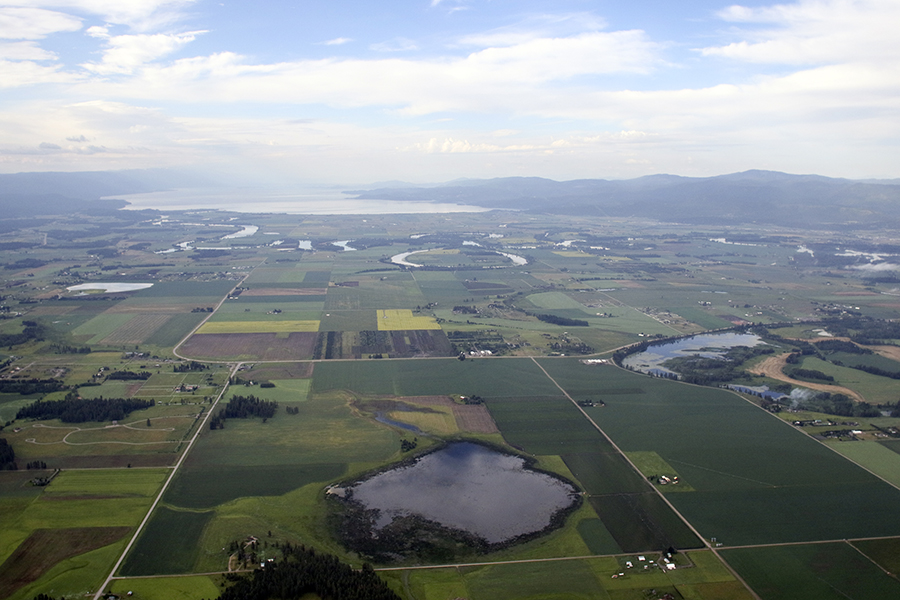High Court Upholds Zoning Restrictions on Creston-area Bottling Plant
The recent Montana Supreme Court ruling allows Montana Artesian Water Company to continue its existing commercial operations deemed a ‘legal non-conforming use’
By Tristan Scott
Nearly four years after 70% of Flathead County voters approved a special zoning district to prohibit industrial operations in the agriculturally rich Creston area, the Montana Supreme Court upheld the citizen-initiated land-use decision while determining it precludes further development of a controversial water-bottling plant.
However, the court ruled the zoning district’s expansion cannot retroactively delegitimize the bottling facility’s commercial functions as they existed prior to the district’s enactment in June 2018, thus allowing the plant to continue producing bottled water, albeit on a much smaller scale than its owner originally intended.
The high court’s March 22 decision allows Montana Artesian Water Company (MAWC) to continue functioning as a business entity but only to the extent it was doing so at the time of the zoning district’s expansion, which took effect on June 21, 2018. MAWC argued that its facility was effectively grandfathered into the zoning district as a legal, nonconforming use, and that the facility’s future growth should be limited only by the building permits it had already received.
The land-use controversy began brewing in 2014 when Creston landowner Lew Weaver incorporated MAWC to produce bottled water on his farmland near Egan Slough along the Flathead River, applying for permits from the state Department of Environmental Quality (DEQ) and Department of Natural Resources and Conservation (DNRC) that would allow his company to annually produce up to 140,000 water bottles per hour, 24 hours a day, seven days a week, equaling roughly 1.2 billion 20-ounce water bottles.
Because MAWC’s water right permit from the DNRC and its wastewater discharge permit from the DEQ are being challenged in separate litigation, the Supreme Court opinion assumes those permits are valid for the purposes of its decision on the zoning district.
Written by Justice Ingrid Gustafson, the unanimous decision fell short of delivering a full-scale victory to opponents of MAWC; however, it did limit the commercial water-bottling plant’s future growth, while finding that the citizen initiative to expand the zoning district was compliant with the Flathead County Growth Policy.
“I think one important touchstone of the court’s decision was to recognize the limitations in terms of what MAWC can do in the future,” said Roger Sullivan, an attorney representing the plaintiffs and appellants, including the groups Egan Slough Community and Yes! For Flathead Farms and Water, along with resident Amy Waller. “These regulations will substantially limit what it intended for the expansion of its operations.”
A representative of MAWC did not respond to the Beacon’s requests for comment.
Litigation over the validity of the initiative has been wending through the lower court since 2018, when the plaintiffs filed suit against the Flathead County Commission, the Flathead County Planning Department, the Flathead City-County Health Department, and MAWC.
Over the course of the litigation, MAWC argued the ballot initiative and the new zoning district were illegal on several fronts, including because they constitute spot zoning, adversely impact landowners within the district and failed to comply with statutory requirements.
In response, Flathead County District Judge Robert Allison upheld the ballot initiative and the expansion of the zoning district as legal, but also ruled that MAWC could continue to operate within the zoning district’s boundaries as a pre-existing, non-conforming use that is effectively grandfathered in. On appeal to the high court, the appellants sought to overturn Allison’s ruling, arguing the scope of MAWC’s operations at the time of the zoning district’s expansion did not include producing, selling or shipping commercial quantities of bottled water, and therefore cannot be deemed “pre-existing.”
Speaking on behalf of the plaintiffs, Waller said they “are very pleased with the Montana Supreme Court’s decision,” adding that they prevailed on 11 out of 12 issues raised.
Among the issues raised by MAWC was that water rights, like other property rights, are protected against unreasonable state action, with MAWC arguing that enforcement of the zoning district amounted to a “compensable taking” of its water right. However, the Supreme Court determined the “purported taking here is not the functional equivalent of a direct appropriation of property.”
“Montana Artesian has not lost its water right or its property interest in that water right as a consequence of the regulations,” Gustafson wrote in the opinion.